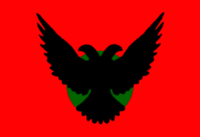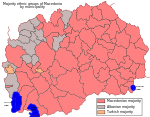- Ashkali and Balkan Egyptians
-
Not to be confused with Egyptians.
Ashkali/Egyptians 
Ashkali flag (Matica Aškalija, Amëza e Ashkalive), designed in 1999 by Abedin Toplica.[1] Total population 30,000-50,000 Ashkali[2]
5,000+ EgyptiansRegions with significant populations  Kosovo[a]
Kosovo[a]
 Albania
Albania
 Montenegro 1,539 Egyptians (2003)
Montenegro 1,539 Egyptians (2003)
 Macedonia 3,713 Egyptians (2002)
Macedonia 3,713 Egyptians (2002)
 Serbia 814 Egyptians (2002)
Serbia 814 Egyptians (2002)Languages Religion predominantly Islam
Related ethnic groups Romani people, Albanians
Egyptians (disputed)In the Balkans, the Ashkali (also Hashkali, Aškalije (Ашкалије), Haškalije (Хашкалије)) and Egyptians (Balkan Egyptians, Jevgs, Egjiptjant or Gjupci) are Albanian-speaking ethnic minorities (recognized communities) of Kosovo and Albania. Observers consider them Albanized Romanies, but they do not self-identify as such. Prior to the Kosovo War of 1999, Albanized Roma registered themselves as Albanians. Now they are divided by identifying with two different groups, although the people share a culture, traditions and language (Albanian).[2]
During the Kosovo War, Albanized Roma were displaced as refugees in Albania and the Republic of Macedonia. Albanized Roma formed the Ashkali as an ethnic group in 1999, as they tried to show their pro-Albanian stance and distinguish themselves from the Roma. The latter were considered to be pro-Serbian during the war and thus opposed by the Albanians. Many of the Albanized Roma were then sent to refugee camps with Roma, with whom they did not share the same language and customs.[2]
Albanized Roma formed the ethnic group known as the Egyptians to distance themselves from other Roma in Macedonia. The ethnic identity was adopted by Albanized Roma in Kosovo who wanted to separate themselves both from other Roma and Albanians.
Contents
History
The Ashkali claim that they came from Persia via Ashkelon in the 4th century AD [1]. The Balkan Egyptians say that they originated from Egypt in ancient times.[3]
The name "Ashkali" comes from the Turkish root-word As (Has). It was earlier applied to sedentary Roma who settled in Albanian areas during Ottoman Empire times. The Ashkalija speak Albanian as their first language. Ashkalija often worked as blacksmiths, or manual laborers on Ottoman estates. Ashkalija are found mainly in eastern and central Kosovo.
A 14th-century reference to a placename (Агѹповы клѣти, Agupovy klěti) in the Rila Charter of Ivan Alexander of Bulgaria is thought to be related to the Balkan Egyptians according to some authors, such as Konstantin Josef Jireček.[4][5]
In 1990, an Egyptian association was formed in Ohrid, Macedonia. During the Kosovo War, Albanized Roma were displaced as refugees in Albania and the Republic of Macedonia. Many Ashkali fought in the Kosovo Liberation Army. Albanized Roma formed the ethnic group Ashkali after the end of the war in 1999, to show their pro-Albanian stance and distinguish themselves from the Roma, who had been negatively viewed as pro-Serbian during the war. Many Albanized Roma were also sent to refugee camps with other Roma, with whom they did not share the same language and customs.[2] As the majority of Kosovo (or Albanized) Roma, many Ashkali refugees settled in Serbia and Montenegro. There they were identified as Black Montenegrins and Romano-Palestinians. The first Ashkali party (Democratic Party of the Ashkali Albanians of Kosovo) was formed in 2000 under Sabit Rrahmani, who supported Kosovo independence in the name of all Ashkali.[2]
In Kosovo, the Ashkali were aligned with Albanians before, during and after the Kosovo War.[2] However, Ashkali, along with Romani Gypsies from Kosovo, have reportedly been expelled from the area.[6]
Distribution
Most Ashkali and Egyptians live in Kosovo and Republic of Macedonia, but the peoples also reside in Albania, Serbia and Montenegro. In the Macedonian census of 2002, 3,713 people self-identified as "Egyptian". In the Serbian census of 2002 (excluding Kosovo), 814 people self-identified as "Egyptian". In the Montenegrin census, 225 people self-identified as "Egyptian" or "Palestinian Judas" from Ashkelon.
Kosovo
Ashkali are predominant in the central and eastern regions of Kosovo; Ferizaj, Fushe Kosove and Lipjan (Serbian: Uroševac, Kosovo Polje and Lipljan). Egyptians live in western Kosovo; in Gjakove, Istog, Peje and Deçan (Serbian: Đakovica, Istok, Peć and Dečani). The Ashkali/Egyptian community of Kosovo had 98% unemployment in 2009.[7]
Culture
While Roma, Ashkali, and Egyptians claim ethnic differences among them, they frequently intermarry. But, overall marriages between Roma and non-Roma (Gadje, outsiders) are extremely rare. Egyptians, Roma, and Ashkalija do not classify one another as Gadje.[7]
The Ashkali and Roma claim the Egyptians as their own; whereas the Ashkali and Egyptians dispute over each others' background.[2] No television or radio channels are dedicated to Askhali or Egyptian minority audiences.[7]
Language
Both ethnic groups speak Albanian as their first language.
See also
- Democratic Ashkali Party of Kosovo
- Matica Aškalija in Novi Sad, Vojvodina
- Ashkali flag at FAME
References
a. ^ Kosovo is the subject of a territorial dispute between the Republic of Serbia and the self-proclaimed Republic of Kosovo. The latter declared independence on 17 February 2008, while Serbia claims it as part of its own sovereign territory. Its independence is recognised by 85 UN member states.
- Dragan Novaković, Potomci faraona u Srbiji, DT Magazin, 4. April 1998.
- Marushiakova, Elena et al.Identity Formation among Minorities in the Balkans: The cases of Roms, Egyptians and Ashkali in Kosovo, Sofia: Minority Studies Society (Studii Romani), 2001
- ^ Abedin Toplica: "Flamuri Kombëtar i Ashkalive / Zastava Aškalija / The National Flag", Ashkali Horizonti, nr. 2, 2003 www.ashkali.org.yu "The flag is red with a black rising eagle in front of a green disk. The red and black color are similar to the Albanian flag. The green disk represent[s] Islam"
- ^ a b c d e f g http://books.google.se/books?id=6C7w6q_-VbQC
- ^ "NEW ETHNIC IDENTITIES IN THE BALKANS: THE CASE OF THE EGYPTIANS"
- ^ Даскалова, Ангелина; Мария Райкова (2005) (in Bulgarian). Грамоти на българските царе. София: Академично издателство "Марин Дринов". p. 57.
- ^ Trubeta, Sevasti (March 2005). "Balkan Egyptians and Gypsy/Roma Discourse" (PDF). Nationalities Papers 33 (1): pp. 71–95. doi:10.1080/00905990500053788. http://taylorandfrancis.metapress.com/index/N241R07987226088.pdf.
- ^ Memorandum of the Society for Threatened People on the Issue of Lead Poisoning of Roma in IDP Camps in Kosovo, GFBV.
- ^ a b c http://www.minelres.lv/reports/S&M/Kosovo_ShadowReport_BalkanSunflowers_2009.pdf
External links
- NEW ETHNIC IDENTITIES IN THE BALKANS: THE CASE OF THE EGYPTIANS
- Differences of prejudices and collective blames toward to the Balkan’s Egyptians
- Egjiptianëve Kosovarë
- Union of Balkan's Egyptians
- The New Democratic Initiative of Kosovo (Iniciativa e re Demokrarike e Kosovës)
- New Democratic Initiative of Kosovo, based in Switzerland
- Minority Rights Group
 Ethnic groups in the Republic of Macedoniaaccording to 2002 census data
Ethnic groups in the Republic of Macedoniaaccording to 2002 census dataOver 10,000 people Macedonians (1,297,981) · Albanians (509,083) · Turks (77,959) · Roma (53,879) · Serbs (35,939) · Bosniaks (17,018)Under 10,000 people Other groups Torlaks (approx. 150,000) · Shopi (approx. 50,000) · Macedonian Muslims (40,000 - 100,000) · Gorani (approx. 2,500) · Megleno-Romanians (approx. 1,000) · Armenians (approx. 300) · Jews (approx. 200) · MontenegrinsEthnic groups of Montenegro Montenegrins · Serbs · Albanians · Bosniaks(+Muslims by nationality) · Croats · Macedonians · Roma (+Ashkali) · Turks · Yugoslavs Ethnic groups in AlbaniaAlbanians · Armenians · Aromanians (Vlachs) · Greeks · Macedonians · Montenegrins · Serbs · Bulgarians · Ashkali and Egyptians
Ethnic groups in AlbaniaAlbanians · Armenians · Aromanians (Vlachs) · Greeks · Macedonians · Montenegrins · Serbs · Bulgarians · Ashkali and EgyptiansEthnic groups in Serbia Central Serbia Serbs · Albanians · Bosniaks · Ethnic Muslims · Bulgarians · Croats · Macedonians · Montenegrins · Roma · Romanians (Vlachs) · YugoslavsVojvodina Banat Bulgarians · Bunjevci · Croats (Šokci) · Germans (Danube Swabians and Banat Swabians) · Hungarians (Szekelys) · Montenegrins · Macedonians · Pannonian Rusyns · Roma · Serbs · Slovaks · Yugoslavs · Romanians · Czechs · Slovenes · Gorani people · Ukrainians · Albanians · RussiansKosovo[a] ^a Kosovo is the subject of a territorial dispute between the Republic of Serbia and the self-proclaimed Republic of Kosovo. The latter declared independence on 17 February 2008, while Serbia claims it as part of its own sovereign territory. Its independence is recognised by 85 UN member states.Majority CaucasianMinority Abkhazians · Bulgarian (Pomaks) · Georgians · Greek · Macedonian · Ossetians · Romanis
Categories:- Ashkali
- Ethnic groups in the Balkans
- Ethnic groups in Kosovo
- Ethnic groups in Albania
- Ethnic groups in Serbia
- Ethnic groups in Vojvodina
- Muslim communities in Europe
Wikimedia Foundation. 2010.

